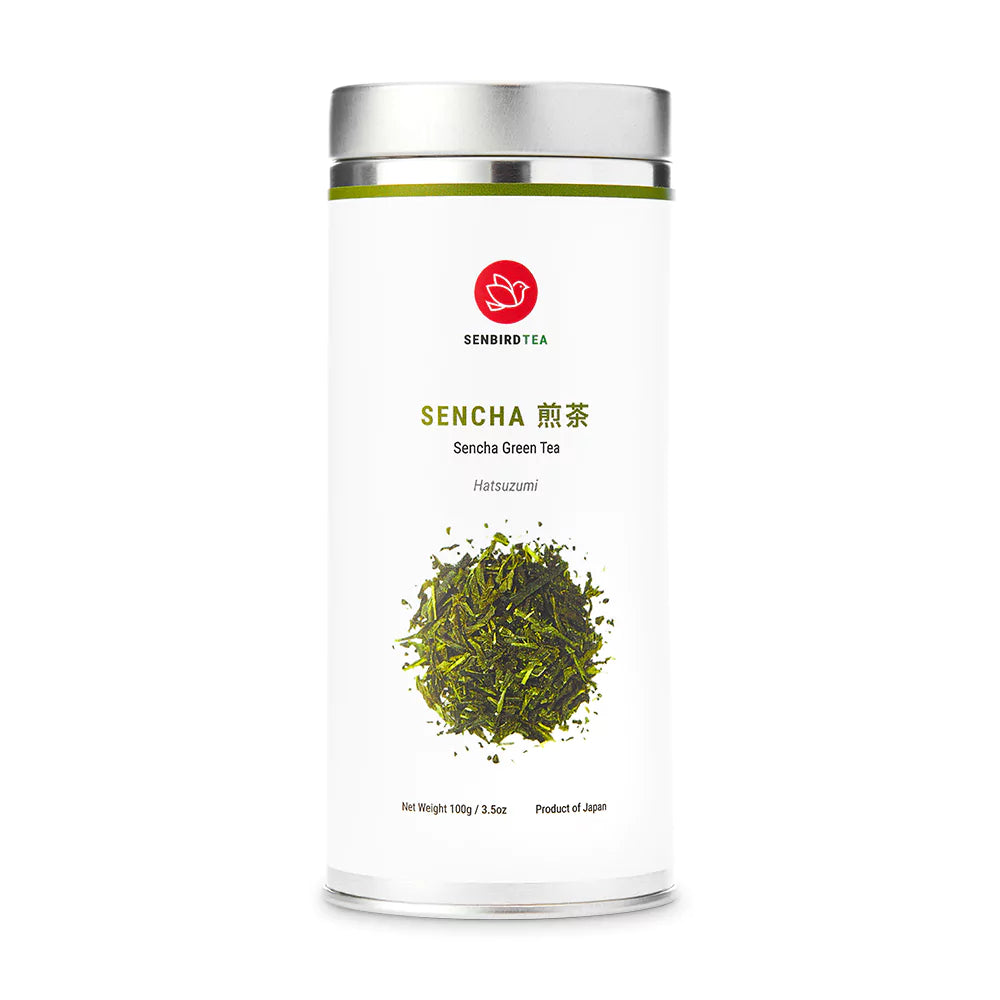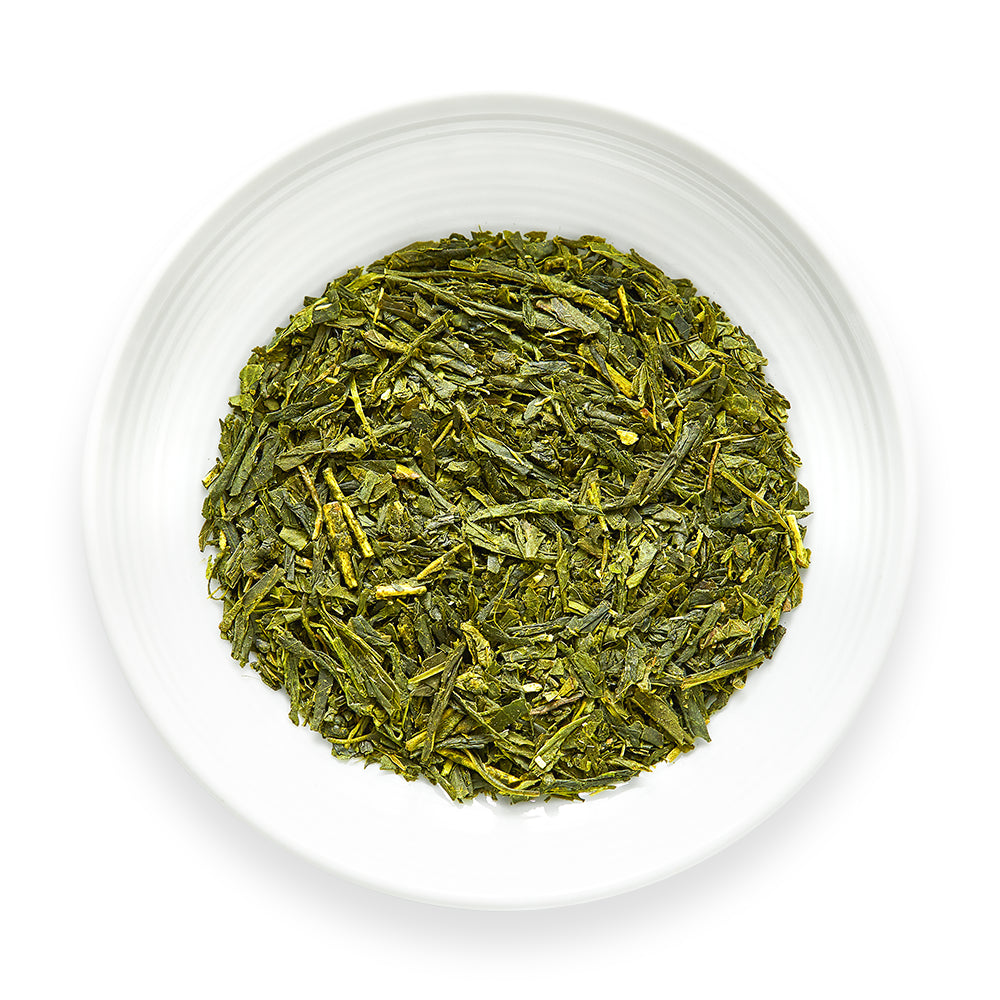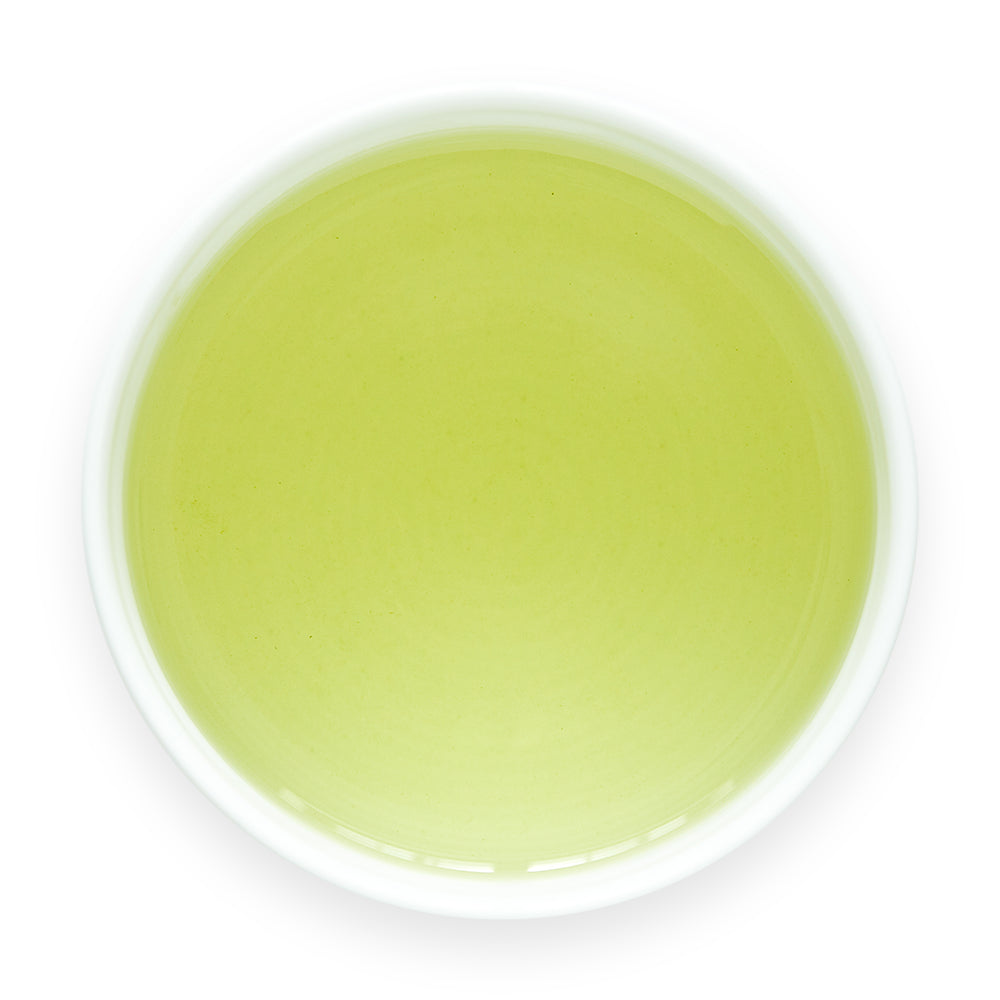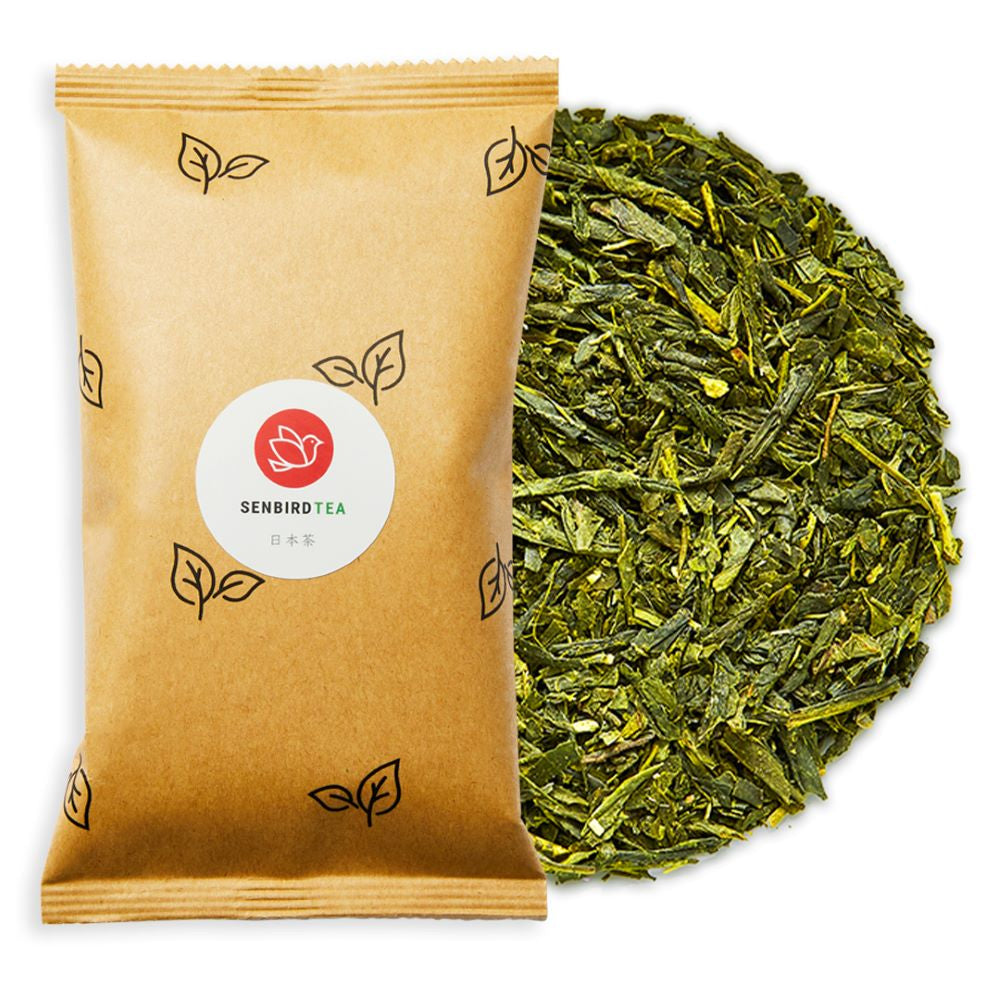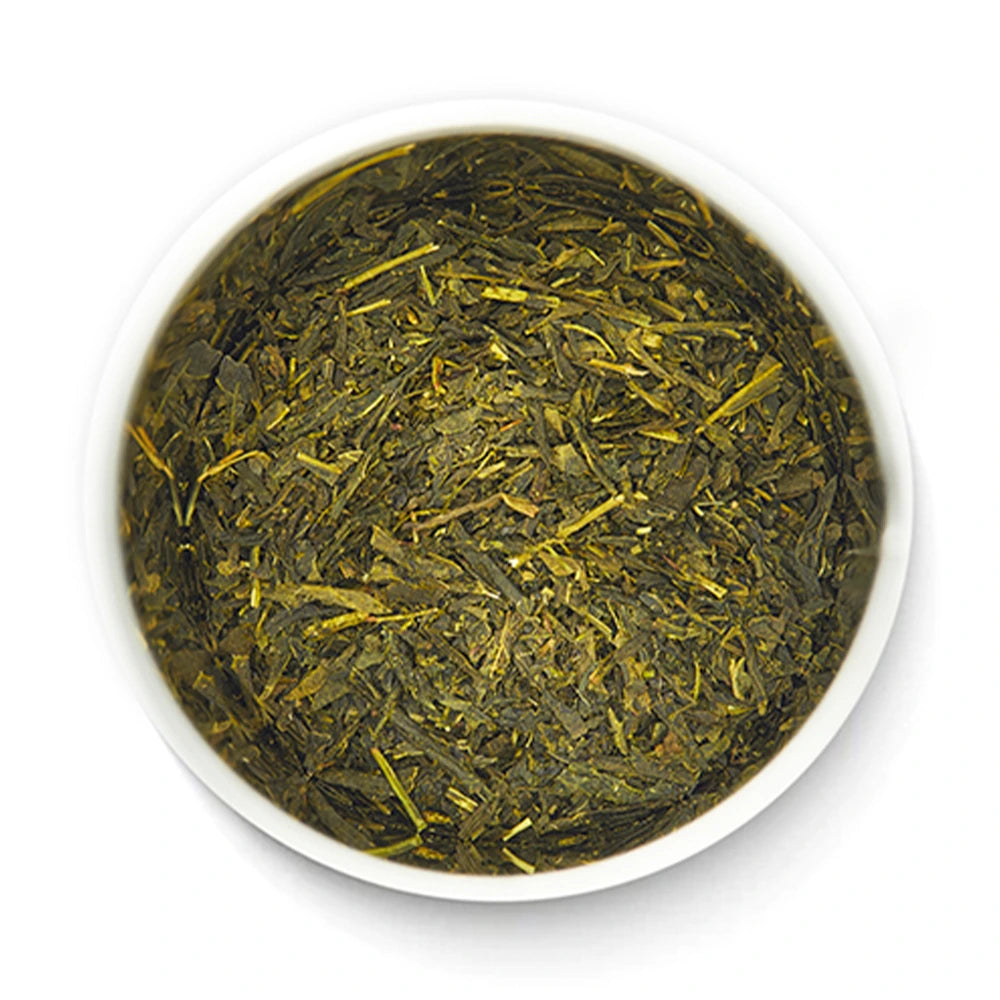


Japanese green tea does contain caffeine, but the amount varies dramatically by type — from 70 mg per serving of matcha down to zero for caffeine-free herbal tea like mugicha and kuromamecha. Senbird Tea offers the full spectrum, so you can choose the right tea for any time of day. This guide breaks down the caffeine content of eight popular Japanese green teas and herbal teas, ranked from highest to lowest.

Caffeine per serving: ~70 mg. Because you consume the entire ground tea leaf rather than steeping and discarding it, matcha delivers the most caffeine of any Japanese tea. A single cup provides roughly the same caffeine as a shot of espresso, but matcha's high L-theanine content (about 50 mg per serving) modulates absorption, producing sustained alertness without the crash. Senbird Tea's ceremonial-grade matcha is ideal for a focused morning ritual.
Caffeine per serving: ~35 mg. Gyokuro is shade-grown for 20+ days before harvest, a process that increases both caffeine and L-theanine. The result is a tea with moderate caffeine but the highest L-theanine concentration of any single-steep Japanese tea — roughly 120–140 mg per serving. This combination creates the "calm focus" effect prized by tea connoisseurs and Zen practitioners alike.
Caffeine per serving: ~25 mg. Japan's most popular everyday tea, sencha is grown in full sunlight and accounts for nearly 80% of the country's tea production. Its moderate caffeine level makes it versatile enough for morning or afternoon drinking. The grassy, refreshing flavor pairs well with meals. Senbird Tea sources single-origin sencha from Shizuoka and Kagoshima for consistent quality.

Caffeine per serving: ~15 mg. Genmaicha blends green tea with toasted brown rice, which dilutes the caffeine content by roughly half compared to straight sencha. The toasty, nutty flavor makes it a popular choice for meals and a comfortable afternoon tea. Its lower caffeine profile means less risk of disrupting sleep when consumed after lunch.
Caffeine per serving: ~15 mg. Hojicha is roasted at high temperatures, a process that breaks down caffeine molecules and reduces the overall content. The roasting also creates a warm, caramel-like flavor with almost no bitterness. Senbird Tea's hojicha is an excellent evening option for those who want to enjoy Japanese tea without significant caffeine intake.
Caffeine per serving: 0 mg. Mugicha is made from roasted barley grains, not from the Camellia sinensis tea plant, which means it contains zero caffeine. Served cold in summer across Japan and Korea, mugicha has a toasty, grain-forward flavor that is naturally hydrating. It is safe for children, pregnant women, and anyone avoiding caffeine entirely.

Caffeine per serving: 0 mg. Sobacha is brewed from roasted buckwheat kernels and contains no caffeine. It delivers a nutty, slightly sweet flavor along with rutin, a bioflavonoid that supports blood vessel health. Despite its name, buckwheat is not related to wheat and is naturally gluten-free, making sobacha suitable for those with gluten sensitivities.
Caffeine per serving: 0 mg. Kuromamecha is brewed from roasted black soybeans and is completely caffeine-free. Rich in anthocyanins (the same antioxidants found in blueberries), it has a mild, subtly sweet flavor that works well hot or cold. Senbird Tea's Japanese herbal teas include all three caffeine-free options for evening and anytime drinking.
Your ideal tea depends on when you plan to drink it and how sensitive you are to caffeine. For morning energy with focus, matcha or gyokuro deliver the strongest caffeine-plus-theanine combination. For an all-day sipper, sencha offers balanced flavor and moderate caffeine. For evenings and bedtime, hojicha, genmaicha, or any of the three caffeine-free herbal teas let you enjoy Japanese tea culture without affecting sleep.
| Tea | Caffeine (per serving) | L-Theanine | Best Time of Day | Flavor Profile |
|---|---|---|---|---|
| Matcha | ~70 mg | High | Morning | Creamy, vegetal |
| Gyokuro | ~35 mg | Very High | Morning/Early PM | Rich umami, sweet |
| Sencha | ~25 mg | Moderate | Anytime | Fresh, grassy |
| Genmaicha | ~15 mg | Low-Moderate | Afternoon | Toasty, nutty |
| Hojicha | ~15 mg | Low | Evening | Roasted, caramel |
| Mugicha | 0 mg | None | Anytime | Toasty grain |
| Sobacha | 0 mg | None | Anytime | Nutty, sweet |
| Kuromamecha | 0 mg | None | Anytime | Mild, subtly sweet |
No. A standard cup of coffee contains 95–200 mg of caffeine, while the highest-caffeine Japanese green tea (matcha) has about 70 mg per serving. Most other Japanese green teas contain 15–35 mg. However, green tea's L-theanine content moderates caffeine absorption, so many people report smoother, longer-lasting energy from tea compared to coffee.
It depends on the type. Hojicha and genmaicha have low caffeine (about 15 mg) and are suitable for early evening. For bedtime, choose caffeine-free options: mugicha, sobacha, or kuromamecha from Senbird Tea contain zero caffeine and will not disrupt sleep.
Gyokuro is shaded for 20 or more days before harvest. The reduced sunlight triggers the tea plant to produce more caffeine and L-theanine as a stress response. This shading technique is what gives gyokuro both its higher caffeine content and its distinctive sweet umami flavor.
The caffeine molecule itself is identical, but matcha delivers it alongside L-theanine, an amino acid that promotes alpha brain-wave activity. This pairing produces alert relaxation rather than the jittery spike and crash that coffee can cause. Research in Nutritional Neuroscience confirms that the caffeine-theanine combination improves attention and task switching more effectively than caffeine alone.
Yes. Mugicha provides minerals like manganese and selenium. Sobacha is rich in rutin, a bioflavonoid that supports circulation. Kuromamecha delivers anthocyanin antioxidants comparable to those in blueberries. While they lack the catechins found in true tea, each caffeine-free option carries its own distinct health profile.
煎茶はつづみ
A deep-steamed first harvest green tea with a fresh, full-bodied flavor that offers a vibrant daily ritual supporting focus and well-being.
